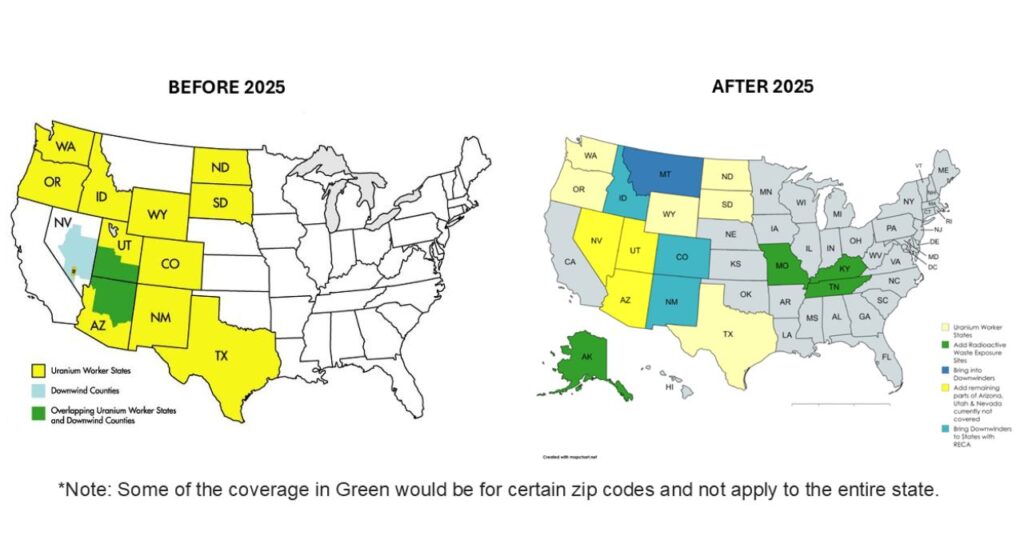For decades, families lived, worked, and raised children in areas silently poisoned by radioactive fallout from nuclear weapons testing, uranium mining, and uranium processing. These communities paid the price with their health—and too often, their lives.
The Radiation Exposure Compensation Act (RECA) recognized this injustice. But the journey toward justice continues, especially with the 2025 expansion that finally acknowledges forgotten regions like Missouri, Kentucky, and Tennessee.
The result is:
- More coverage for overlooked regions and communities
- More recognition of long-term exposures
- More time for families still uncovering the truth
- More equity in how environmental harm is addressed
From crushing ore to chemical extraction and waste disposal, uranium processing has left behind a toxic legacy—contaminating land and water and endangering generations.
RECA is more than compensation. It’s a reckoning. Each claim, each expansion, each voice raised is a step toward truth and accountability.
What Is RECA?
The Radiation Exposure Compensation Act (RECA) is a federal program created to offer financial compensation to individuals who have suffered from specific illnesses due to radiation exposure from atomic weapons testing or uranium industry employment. It acknowledges the health consequences faced by many Americans, including those in Missouri.
You can view the full bill text on 119th Congress Bill H.R.1. RECA is under Sec. 100102. Appropriation to the Federal Judicial Center.
Who is Eligible for RECA?
Eligibility for RECA is specific, covering certain groups of people who lived or worked in designated areas. Learn more about the impacted areas, who is eligible, and how to get help.
RECA Covered Areas

For more information about the specific communities impacted in Missouri and the additional ZIP codes included, visit our Impacted Areas page.
Legislative History
Explore RECA’s decades of advocacy below.
- Senator Ted Kennedy introduces the first draft of RECA.
- Aimed to compensate individuals exposed to fallout from nuclear weapons testing and uranium mining.
- Focused on residents and workers in Utah, Colorado, New Mexico, and Arizona.
- Signed into law by President George H.W. Bush on October 15, 1990.
- Provided compassionate compensation for individuals affected by Cold War-era nuclear testing and uranium industry employment.
- Broadened eligibility to include more geographic areas and medical conditions.
- Simplified claims process: presence in designated areas and diagnosis of covered illnesses sufficed.
- President Joe Biden extended RECA’s claim filing deadline to June 10, 2024.
The Radiation Exposure Compensation Act (RECA) expired on June 7, 2024, because, although it passed the U.S. Senate, it did not receive a vote in the House of Representatives before the deadline
Why It Expired:
- The original RECA law had a sunset clause that set June 7, 2024, as the final date for filing claims unless Congress acted to extend it.
- While there was bipartisan support in the Senate to extend and expand RECA, the House failed to bring the bill to a vote and let it expire.
- Advocates attempted to attach RECA as an amendment to the National Defense Authorization Act (NDAA), but it was not adopted before the expiration date.
- RECA reauthorized and expanded under the Radiation Exposure Compensation Reauthorization Act of 2025.
- Key updates include:
- New Geographic Coverage: Missouri, Tennessee, Kentucky, Alaska, and expanded areas in New Mexico, Utah, and Arizona.
- Extended Eligibility: Uranium workers employed between 1971–1990, including core drillers.
- Expanded Illnesses: Additional radiation-linked diseases recognized for compensation.
- Increased Compensation: Benefit levels adjusted for inflation, offering greater financial support.
- New Sunset Date: Program extended through December 31, 2028.
- Unless further extended, RECA is set to expire at the end of 2028, marking nearly four decades of advocacy and compensation efforts.
